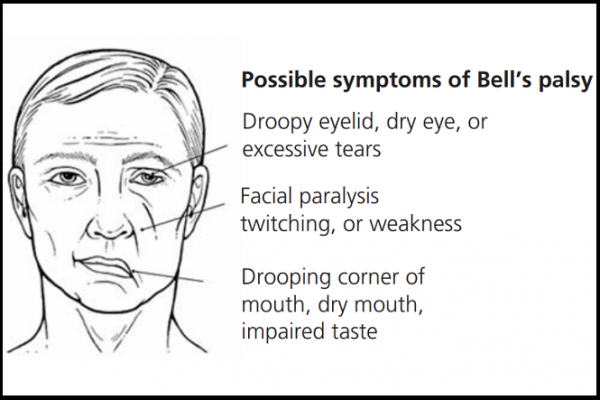Bell's palsy
Also called facial palsy
Key points about Bell's palsy
- A Bell's palsy is the temporary weakness of the nerves on the face.
- It usually happens on one side of the face.
- Unlike a stroke, the facial weakness of Bell's palsy develops slowly, over hours or days.

Symptoms of Bell's palsy usually develop slowly over hours or days and include:
- Drooping of the face on one side.
- Facial pain around your ear on the affected side.
- When you smile, only one side of the face may move, you may not be able to frown and speaking clearly may be difficult.
- Difficulty closing your eye. It may not fully close and may water or become dry
- Difficulty when chewing food on the affected side, you may dribble slightly and food may become trapped between your gum and cheek.
- Some difficulty with speech, as the muscles in the side of the face help in forming some words, eg, words beginning with a P.
- Altered or loss of taste on one side of your tongue.
- Sensitivity to noise. Noises may sound louder than usual which can be uncomfortable.
If you have symptoms of Bell’s palsy, see your doctor urgently so they can rule out any other serious conditions like a stroke or a tumour.
Although the symptoms of Bell's palsy are similar to that of a stroke, they are different conditions. Symptoms of a stroke usually come on suddenly. You must seek emergency help if you experience any of the following symptoms of stroke.
| Call 111 for an ambulance immediately if you have any of these signs of a stroke: |
| Face: Is it drooping on one side? Arm: Is one arm weak? Speech: Is it mixed-up, slurred or lost? Take action: Call 111 immediately. These are signs of a stroke. Read more about stroke. |
Who gets Bell's palsy?
Anyone can develop Bell's palsy and it affects men and women equally. It most commonly occurs between the ages of 15 and 60 years. About 1 in 60 people have a Bell's palsy at some stage in their life. It is more common in people with diabetes and also in women who are pregnant.
You'll usually only get Bell's palsy once, but it can sometimes come back. This is more likely if you have a family history of the condition.
What causes Bell's palsy?
In Bell's palsy the facial nerve is damaged, affecting the face muscles. Often doctors don’t know why the nerve becomes damaged, but sometimes it's caused by a virus like a herpes virus (shingles or chickenpox(external link)(external link)), ear infections, or trauma such as an injury to the head.
No. Bell's palsy is a local problem confined to the facial nerve and facial muscles. If you have other symptoms, such as weakness or numbness in other parts of your body, there will be another cause and you should tell your doctor.
Prednisone tablets
You may need a course of prednisone tablets. Prednisone is a steroid medicine which may help to reduce inflammation and decrease the likelihood of damage to the nerves. Treatment is more effective if started within 72 hours (3 days). Read more about prednisone.
Antiviral medication
If the cause of Bell's palsy is shingles (viral infection), then your doctor may prescribe a course of antiviral medication such as aciclovir or valaciclovir. If the cause is not due to shingles, then it is unlikely that antiviral medication will be helpful.
Eye care
If your eye is affected, then good eye care is very important. If your eye does not close when blinking, your eye can dry up. You should use eye drops or artificial tears to keep the eye moist. Use artificial tear drops during the day and a thicker solution at night. Ask your doctor or pharmacist for advice.
Also, your eye will not have the normal protection from your eye lid closing. It is important to protect your eye and avoid scratching the cornea (the thin, transparent layer covering the eye). You may be advised to wear an eye patch by day and to tape the affected eye lid closed at night. Tape such as micropore can be used for this.
Wear sunglasses when outdoors or protective glasses where exposure to dust or debris may happen. Report any symptoms of eye irritation, pain or changes to vision to your GP or optometrist.
Mouth care
As your facial muscle may not be functioning fully, food may become lodged around your teeth and gums on the affected side. It is important to clean this area well and remove all debris after eating.
Facial exercises
Facial exercises can be useful to tone the face muscles as the movement begins to return. For example:
- Gently raise your eyebrows – you can help the movement with your fingers.
- Wrinkle your nose.
- Try and flare your nostrils.
- Lift one corner of the mouth and then the other.
- Smile without showing your teeth, then smile with showing your teeth.
- Bring your eyebrows together in a frown.
If you feel the exercises are making your symptoms worse, reduce the number or frequency of the exercises or seek advice.
Approximately 80 percent of people who have Bell's palsy start to improve within 3 weeks, and make a full recovery within 2–3 months.
However, about 5–10 percent of people have some slight weakness which remains forever. Rarely, there may be little or no improvement.
Living with Bell's palsy can make you feel depressed, stressed or anxious. Speak to a GP if it's affecting your mental health.
Bell's palsy(external link) NIH, US
Bell's palsy(external link)(external link) PatientInfo, UK
Bell's palsy(external link)(external link) NHS, UK
Signs of stroke – FAST(external link) Stroke Foundation of NZ
References
- Management of Bell’s palsy(external link)(external link)(external link) Australian Prescriber
Credits: Healthify editorial team. Healthify is brought to you by Health Navigator Charitable Trust.
Reviewed by: Dr Helen Kenealy, geriatrician and general physician, CMDHB
Last reviewed:
Page last updated:






